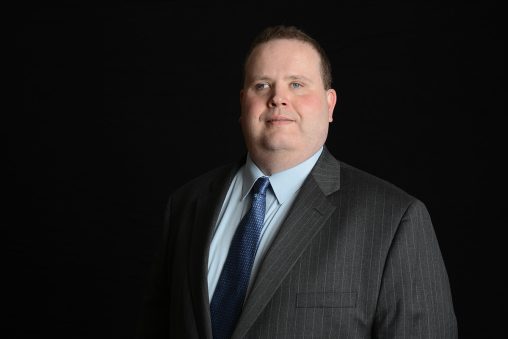Gary Norman is a Wright State University graduate, attorney, consultant, husband, adjunct professor, public servant, member of multiple boards, award winner and a Presidential Management Fellow.
He is also blind.
Disability poses a multitude of benefits and challenges. Regrettably, society often frames disability as a deficit, Norman said. Norman has met those challenges head-on and continues to prosper while striving to help others.
Norman is a senior staff attorney with the Centers for Medicare and Medicaid Services in Baltimore.
He was diagnosed with retinitis pigmentosa when he was in elementary school and has long since been classified as legally blind. Retinitis pigmentosa is a rare genetic eye disorder, with various eye diseases based on genetic mutations. Many forms of the disorder cause gradual loss of vision, often with total loss of sight.
“In most ways, the lifelong work to accept myself and to adapt to ever-lessening vision has formed me as resourceful, as the smart and as I hope, the special person I am,” said Norman, who is a native of Medina County, Ohio.
A first-generation college student, Norman graduated from Wright State with a bachelor’s degree in history and a minor in political science.
He praised the education and mentorship he received from the faculty and staff in the College of Liberal Arts. He also complimented the services for students with disabilities Wright State provides, noting it is a national leader in such services.
“Wright State provided me with high-quality services as a student with a disability,” said Norman. “The university introduced me to a variety of helpful touchpoints with the external world as a young person. One of the best-included exposures to the theatre, first as part of a general education course and then as a volunteer usher.”
He earned a J.D. from Cleveland State University after graduating from Wright State. Norman earned a Masters in Letters of Law from American University while collaborating with two guide dogs — Langer and Pilot — as he worked full-time and studied part-time.
Norman joined the Centers for Medicare and Medicaid Services as a Presidential Management Fellow, a prestigious program established by the Carter administration to introduce young leaders to public service. He provides legal counsel in complex reimbursement disputes within a boutique law practice.
He also has served as a policy advisor at the Office of Minority Health, co-leading its disability policy portfolio in addressing health disparities met by people with disabilities.
His colleagues elected Norman as a co-valedictorian speaker at the agency’s Aspiring Leaders Program. He has also received two Administrator Awards. In 2008, he served as an American Marshall Memorial Fellow at the European Union while collaborating with Langer.
Colleague Richard Shermanski was mentored by Norman and said he has benefited exponentially as a result.
“Gary was assigned as my mentor through the Maryland Bar Association Leadership Academy and through his mentorship, he has been instrumental in helping me navigate the legal profession as an attorney with invisible disabilities,” said Shermanski. “I consider Gary the gold standard of mentors and it has been an honor to collaborate with him.”
In his youth, Norman initially resisted the fact he was losing his eyesight. But to be independent and highly functioning, he eventually learned skills such as orientation and mobility. In the process, he accepted his failures and celebrated learning.
As a student at Wright State, Norman relied on audio files captured on audio cassettes and collaborated with sighted human readers. He was also introduced to an early version of a screen-reader called JAWS and used Braille on a basic level. Today, his iPhone has screen reader far more advanced than his earliest “talking computer.”
Collaborating with guide dogs since 2001, Norman travels these days with his fourth dog partner, Izzie.
Colleen Lampton-Brill, director of major gifts for the College of Liberal Arts, recruited Norman to serve on the college’s leadership board.
“We finally had the pleasure to meet Gary in person in April when he flew in from D.C. for our biannual board meeting,” said Lampton-Brill. “He and his guide dog, Izzie, are certainly a dynamic duo! He has been a terrific addition to our board.”
Before returning to the Midwest and embarking on a book project sharing stories of leaders in law and policy with disabilities, Norman said he would like to serve as president of the Maryland State Bar Association and secretary of the Maryland Department of Disabilities.
In the meantime, he will continue to advocate for those often overlooked in society.
“Having a disability itself is sometimes frustrating but does not necessarily mean it is a challenge or has to be obstacle-laden,” said Norman. “This is to say that a disability inculcates, with self-acceptance and experience: adaptation, resilience and resourcefulness.”



 Wright State names Rajneesh Suri dean of Raj Soin College of Business
Wright State names Rajneesh Suri dean of Raj Soin College of Business  ‘Only in New York,’ born at Wright State
‘Only in New York,’ born at Wright State  Wright State president, Horizon League leaders welcome new commissioner
Wright State president, Horizon League leaders welcome new commissioner  Wright State celebrates homecoming with week-long block party
Wright State celebrates homecoming with week-long block party  Wright State baseball to take on Dayton Flyers at Day Air Ballpark April 15
Wright State baseball to take on Dayton Flyers at Day Air Ballpark April 15 